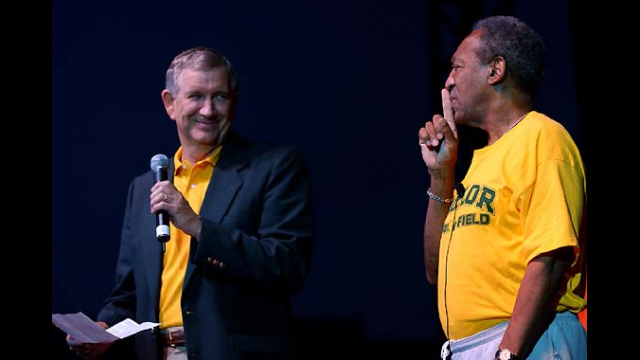By Bob Allen
Baylor University acted Oct. 8 to rescind an honorary doctorate the school awarded to accused serial rapist Bill Cosby in 2003.
The 78-year-old comedian, facing legal challenges from more than 50 women who accuse him of drugging and sexually assaulting them in alleged encounters dating back to the mid-1960s, received the honorary doctor of humane letters degree during a benefit to lift spirits of the Baylor community after a tough summer that began with the murder of basketball player Patrick Dennehy at the hands of teammate Carlton Dotson and unfolded into revelations of irregularities in the athletics program that led to punishment for numerous NCAA violations.
“Baylor University is working to confront the scourge of interpersonal and sexual violence wherever it occurs,” Lori Fogleman, assistant vice president for media communications, said in a written statement. “As a result, Baylor’s Board of Regents has voted to rescind an honorary doctor of humane letters awarded to Mr. Bill Cosby in 2003.”
 The decision comes on the heels of the August conviction of a Baylor football player, defensive end Sam Ukwauchu, for sexual assault in a case from October 2013 involving a former Baylor soccer player. The university recently hired a Philadelphia law firm to conduct an independent external investigation into the university’s handling of the incident.
The decision comes on the heels of the August conviction of a Baylor football player, defensive end Sam Ukwauchu, for sexual assault in a case from October 2013 involving a former Baylor soccer player. The university recently hired a Philadelphia law firm to conduct an independent external investigation into the university’s handling of the incident.
“Because acts of interpersonal and sexual violence contradict our very mission and values, Baylor University is investing significantly to ensure the safety of our campus,” Fogelman said. “Through the efforts of our Title IX Office, we are encouraging victims to report acts of interpersonal and sexual violence, and making sure those suffering from the effects of such acts are provided the necessary support and services to feel safe and be academically successful. It is against this backdrop that Baylor’s Board of Regents has decided to take this action.”
Cosby’s visit to Baylor in 2003 came at the invitation of then-President Robert Sloan, at a time when Sloan faced challenges to his own leadership over his ambitious and costly 10-year strategy of blending strong Christian faith and high academic standards known as Vision 2012. Sloan stepped down in 2005 to become the university’s chancellor until his election in 2006 as president of Houston Baptist University.
A crowd of 20,000 gathered at Floyd Casey Stadium on Sept. 4, 2003, for the “Spirit Rally” show that Cosby offered to do free of charge in order to “lift the spirits of the Baylor and Central Texas communities.” Cosby’s doctorate citation described him as “comedian, actor, author, musician, educator, philanthropist, beloved husband and father, friend.”
“His life exemplifies the culmination of hard work, discipline, and education,” the citation said. “If he had followed life’s easy path, our world would never have known this gentle, funny man whose humor nudges us to achieve our best, whatever career we seek or the circumstances of our lives.”
Cosby has not admitted any of the allegations against him. An Oct. 13 editorial in the Waco Tribune-Herald said the sheer number of allegations made it understandable why Baylor might want to rescind Cosby’s degree, but the case should serve as a cautionary tale for all universities that award honorary degrees. Cosby has at least 57 of them.
